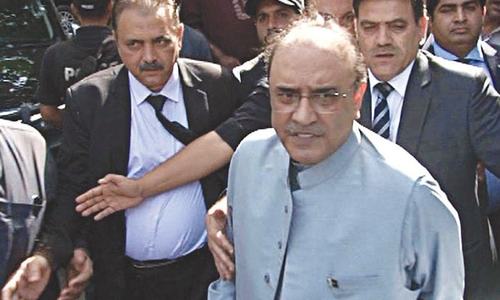A JIT CULTURE that appears to have developed in the country — institutions and political parties seeking ad hoc, intelligence agencies-driven Joint Investigation Teams to probe all manner of public malfeasance and corruption — has been carried to a mirthful new level.
Criticising the electricity and gas shortages in the country, former prime minister Shahid Khaqan Abbasi on Saturday demanded the formation of a JIT to probe who is responsible for the ongoing energy crisis. Perhaps Mr Abbasi was speaking in a lighter vein, but other political leaders do not appear to share Mr Abbasi’s humour.
Also read: JIT deletion
Revelations last week that a sister of Prime Minister Imran Khan has more previously undisclosed properties abroad resulted in some opposition leaders immediately demanding that a JIT be formed and Mr Khan’s sister be placed on the ECL. It appears that the leading opposition parties, the PML-N and the PPP, believe that since their leaders have been subjected to unfair JIT processes, the PTI must suffer similarly.
The opposition is wrong. The emergence of JITs is a trend that ought to discouraged, not encouraged. While in certain cases a JIT may be merited, its extensive and unrestrained use undermines normal institutional processes.
Moreover, the intelligence component which gives JITs a perceived weight in certain quarters acts to further muddy institutional waters, renders murky the separation of powers and adds to a perception of civil-military tensions in the country. As the Supreme Court itself has reiterated in recent days in the wake of the controversy over the JIT report on the so-called fake banks account case, a JIT report is not a conclusive finding of fact.
At most, a JIT report can be a starting point for the investigation and prosecution aides of the legal process. And it is in those areas — investigation and prosecution — that the state should concentrate its reform efforts. An effective accountability process is one whose foundations are strong institutions as opposed to ad hoc attempted solutions.
At a time when parliament may take up the issue of again extending the life of military courts for civilians accused of terrorism by the state, would it not further the democratic project by debating and implementing meaningful investigation, prosecution and judicial reforms?
At the moment, the politicisation of JITs virtually ensures that their findings and recommendations are immediately denounced as partisan. The politicisation also helps the political class avoid providing adequate explanations in the court of public opinion — politicians have spent more time attacking the formation and composition of JITs than answering the allegations set out in JIT reports.
If accountability is to be fair, transparent and across the board the process of accountability must be through a stronger institutional framework. Surely if the PTI, PML-N or PPP proposes a strong but transparent accountability process, the other parties will need to seriously consider them.
Instead of demanding JITs for all manner of issues, the political class should debate institutional reforms.
Published in Dawn, January 14th, 2019












































